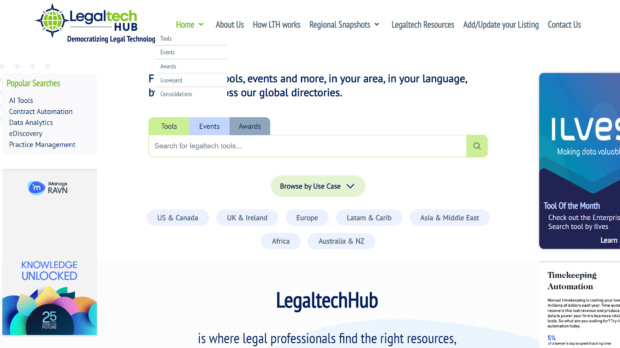This past fall, husband and wife tech team Chris Ford and Nikki Shaver launched an important new technology resource: Legaltechnologyhub.com. Legaltechhub (LTH) is a curated database of legal technology tools, which is enhanced with extensive and careful tagging and taxonomy. The founders are well known throughout the legal tech community. Ford is CMO at the tech company Zero, and Shaver is a former practicing attorney and renowned KM and innovation thought leader. According to Ford and Shaver, LTH took almost a year to build. It was clearly a labor of love in which they made a large personal investment of both time and money. LTH currently includes descriptions of 1,621 products from 84 countries. The database can be searched, filtered, and browsed.
This is a platform that makes me slap my forehead and shout, “Why didn’t I think of that!”
The press release described LTH as “addressing a need for an updated, user-driven resource to find the right legal technology anywhere in the world. LTH is a free resource for users and offers free listings to vendors. Tech companies can opt for fee-based enhanced listings which will include more descriptive content and even videos.”
Yes, there’s Google, but a Google search for legal technology will deliver a hideously bloated and imprecise list of “hits.” I searched for ‘legal project management” software on Google and in .53 seconds it serviced up a truly useless 811,000,000 results which were both repetitive and unreliable. A similar search in LTH delivered 18 product descriptions which I was able to refine by applying additional filters. Which approach works better for the busy IT or KM professional? The developers of LTH were all too familiar with the pressures and pain points of law firm tech professionals.
Legaltechhub is loaded with functionality you can search or browse. The top of the screen includes tabs for products, events, and awards. The product listings are “the main event.” A look at the descriptive features suggests the care invested in helping users get to the best product.

Here is a list of the descriptive information gathered about each product:
- Vendor Name — the organization that produces the tool
- Tool — the name of the tool
- HQ — the country where the vendor is based
- Offices — countries where the vendor has a physical presence
- Functionality — the primary function of the tool (see taxonomy below)
- Sub-Functionality — secondary functions (if any) of the tool
- Practice Area — the area(s) of law to which the tool is targeted
- Platform Language — language(s) of the tool interface
- Linguistic Efficacy — language(s) in which the tool can be utilized
- Target Entity — either small law (solo up to 50 lawyers), law firms, corporates (in-house departments), or barristers
- Deployment — cloud, Web, or on premise
- Integrations — other tools with which the tool is designed to integrate
- Website
- Description
The search results can be filtered by functionality and sub-functionality metadata, HQ location, office, practice area, platform language. deployment, and integrations.
The Graveyard Of Dead Tech Toys
The Functionality Taxonomy. I counted 85 technology types currently listed in the taxonomy. The list includes the usual suspects such as ediscovery and enterprise search but also more specialized offerings such as term sheet analysis, robotic process automation, and structure diagrams.
Additional features include: Regional Snapshots which provide an overview of legal tech in different geographic regions, Legal Tech Resources which directs users to blogs and websites that cover legal tech issues, and Tool of the Month will highlight a tool from the directory on a monthly rotation.
Ongoing Development. According to Ford, they plan to add a compare feature in the future which will provide side-by-side data points for similar products. The Events area is being built out and will include information on large technology conferences. The Awards area will list legal tech awards and details about application and submission dates. Upcoming additions to the platform will include listings for Consultants (specializing in legaltech, legal innovation, knowledge management, legal business strategy, legal design, legaltech design, and legal engineering) and associations and groups for networking, learning, and university/higher education programs that offer legal tech education.
Keeping the Site Green. One of the biggest challenges they face is avoiding dead links. Dead links would probably be the quickest route to discrediting the value of LTH. Ford and Shaver plan to oversee a once-a-month check to validate that all of the links are live and correct.
Although LTH takes a thorough approach, they are clear about their mission. The website states “we deliberately set out to create a useful resource for professionals working in the commercial legal space. Both in-house and in practice.” The website states that they do not cover tools for nonprofit or government legal needs.
Democratizing Legal Tech. In addition to providing a very valuable tool, free to the legal community Ford and Shaver have developed a pro bono plan for the proceeds of paid listings. A portion of revenue will be donated to causes which offer access to justice, education and development.
This article previously appeared on Above the Law.
https://abovethelaw.com/2020/11/legaltechnologyhub-com-find-the-right-technology-tool-fast/